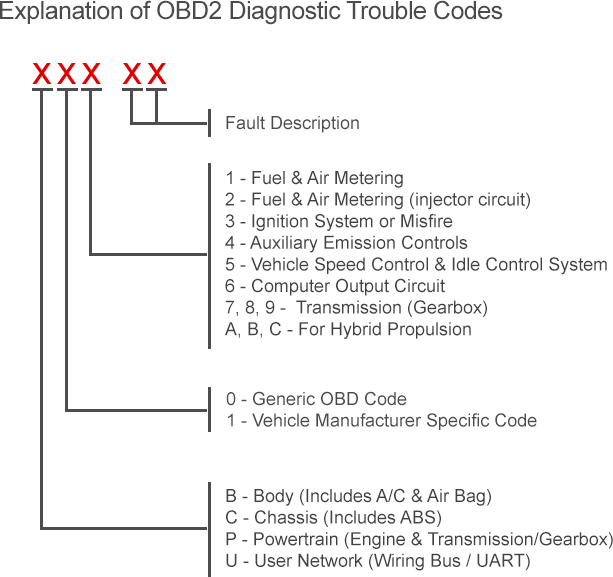What is a Diagnostic Trouble Code (DTC)?
Diagnostic trouble codes (or fault codes) are codes that are stored by the on-board computer diagnostic system. These are stored in response to a problem found in the car by the system. These codes are stored when a sensor in the car reports a reading that is outside the normal/accepted range (Eg: fuel mixture too rich).
These DTC's identify a particular problem area and are intended to provide the technician with a guide as to where a fault might be occurring within the vehicle.
Codes should be used in conjunction with the vehicle's service manual to discover which systems, circuits or components should be tested to fully diagnose the fault with a car code reader or professional OBD2 software.

Difference Between Generic & Manufacturer Specific...
| Code type | Explanation |
| Generic (normally P0xxx) |
The definition for the code is defined in the EOBD / OBD-II standard and will be the same for all manufacturers. |
| Manufacturer-specific (normally P1xxx) |
Where manufacturers feel that a code is not available within the generic list, they can add their own codes. The definitions for these are set by the manufacturer. |
In general, codes that begin with P0 are Generic codes, whereas codes that begin with P1 are manufacturer-specific.
Additional code groups are however available to allow for expansion of these code lists.
The full breakdown of the code groups is shown below:
| Powertrain codes |
| P0xxx - Generic |
| P1xxx - Manufacturer-specific |
| P2xxx - Generic |
| P30xx-P33xx - Manufacturer-specific |
| P34xx-P39xx - Generic |
| Chassis codes |
| C0xxx - Generic |
| C1xxx - Manufacturer-specific |
| C2xxx - Manufacturer-specific |
| C3xxx - Generic |
| Body codes |
| B0xxx - Generic |
| B1xxx - Manufacturer-specific |
| B2xxx - Manufacturer-specific |
| B3xxx - Generic |
| Network Communication codes |
| U0xxx - Generic |
| U1xxx - Manufacturer-specific |
| U2xxx - Manufacturer-specific |
| U3xxx - Generic |
